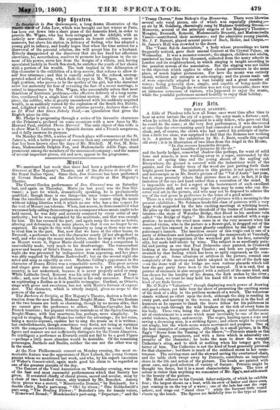1/Hr.
We mentioned last week that there had been a performance of _Don Giovanni at Her Majesty's Theatre, and of the Barbiere di Siviglia at the Royal Italian Opera. Since then, Don Giovanni has been performed at Covent Garden, and the Barbiere di Siviglia at Her Majesty's Theatre.
The Covent Garden performance of Don Giovanni was on Saturday last, and again on Thursday. Mario (as last year) was the Don Gio- vanni • a part for which, dramatically speaking, he is preeminently qualified ; though there is one thing—his tenor voice—which detracts from the excellence of his performance ; for he cannot sing the music without taking liberties with it which no one who has a due respect for the text of Mozart can tolerate. When, last season, he firstcommitted what we cannot help calling those outrages on a composer whose music ought to be
held sacred, he was duly and severely censured by every critic of any authority; but he was applauded by the multitude, and that was enough for him. He has resumed the part, and again sung the music as before, altering and deforming it in many places, so that it can no longer be re- cognized. He might do this with impunity so long as there was no one to rival him in the part. But, now that we have at the other house, in Everardi, a performer who acts the character nearly (if not altogether) as well, and who sings the music much better, since he sings it with purity, as Mozart wrote it, Signor Mario should consider that a comparison is unavoidably made, very much to his disadvantage. The transcendent power and beauty of Grisi's Donna Anna are well-known. On the first night she was prevented by indisposition from appearing, and her place was ahly supplied by Madame Rudersdorff ; but on the second night she acted and sang as superbly as ever. Madame Csillag's appearance in the character of Donna Elvira was a remarkable novelty. This great actress and singer gave due interest and importance to a part which, in this country, is not understood, because it is never properly acted or sung. While Lablache lived, Ronconi was his only rival in the part of Lepo- rello ; and, now that he is dead, Ronconi is his only successor. Pence is as captivating a Zerlina as it is possible to imagine. Gardoni, as °Uteri°, sings with grace and sweetness, but not with Mario's fervour of expres- sion. The character, which is utterly insipid, gives no scope to the powers of the actor.
The Barbiere di Siviglia, at Her Majesty's Theatre, derives a fresh at- traction from the new Resins, Madame Borghi-Mamo. The two Itosinas at the two houses are both so charming, though by no means alike, that we cannot give the preference to either. Miolan-Carvalho has the French tournure ; her piquant vivacity reminds us of the Opera Comique. Borghi-Mamo, with less smartness, has, perhaps more simplicity. In regard to singing, Borghi-Mamo has rather the advantage ; for her voice, being a mezzo-soprano, enables her to sing the music as it is written ; her embellishments, though sometimes very florid, not being at variance with the composer's intentions. Belart sings sweetly as usual ; but his figure and manner are not sufficiently distingues for the Count Almaviva. So intelligent a performer as Everardi could not fail to be a good Figaro —perhaps a little more abandon would be desirable. Of the remaining personages, Bartholo and Basilic), neither the one nor the other was up to the mark.
sit the New Philharmonic concert on Monday evening, the most re- markable feature was the appearance of Herr Lubeck, the young German pianist whom we mentioned last week, and who by his superb execution of Weber' s Concert-stiick, again made good his i claim to be regarded as one of the greatest pianists of the day. The Concert of the Vocal Association on Wednesday evening, was one of the best and most successful performances which that Society has given. It consisted chiefly of choral pieces, sacred and secular, sung by a choir of two hundred voices, ably trained by Mr. Benedict. Among these pieces was a motett, " Misericordia Domini," by Reichardt, for a double choir • Satil's part-song, "Oh! by rivers ; " Otto Goldschmidt's part-song, "The Healing Flower ; " Benedict's trio for female voices, "Homeward Bound ; " Mendelsaohn's part-song, "Departure;" and the
"Tramp Chorus," from Bishop's Guy Mannering. There were likewise several solo vocal pieces, one of which was especially pleasing ;— an air by M. Goldberg, charmingly sung by Madame Goldberg Strosai.— Moreover, several of the principal singers of her Majesty's Theatre- Mongini, Everardi, Ronconi, Mademoiselle Brunetti, and Mademoiselle Vaneri—contributed their assistance ; and the admirable young pianist, Mr. J. F. Barnett, played several pieces of Bach, Heller, and Chopin.— St. James's Hall was crowded to the doors.
The "Tonic Sol-fa Association," a body whose proceedings we have frequently noticed, gave their annual Concert at the Crystal Palace, on Wednesday. It was a monster-concert; the singers, children and adults, lumbered no less than five thousand, collected from the many schools in London and its neighbourhood, in which singing is taught according to the peculiar system of the association. But the singing was not liable to the objection which applies to other choral performers in the same place, of much higher pretensions. For here the music was entirely choral, without any attempts at solo-singing; and the pieces made use of were especially adapted to a vast locality and a great number of voices ; being generally slow, simple, and capable of being made dis- tinctly audible. Though the weather was not very favourable, there was an immense concourse of visitors, who ;appeared to enjoy the music, while the youthful performers seemed heartily to enjoy their holiday.


























 Previous page
Previous page